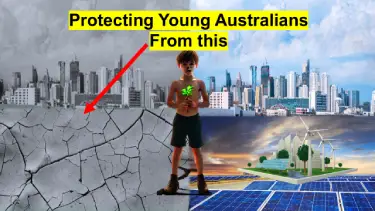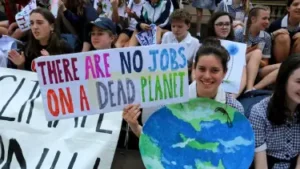Description:
Governments’ Lack of Urgency in Climate Action is Leaving Young Australians Unprotected. Explore how Australia can shift towards ethical politics and climate action using monetary sovereignty for a sustainable future.
Introduction
Younger Australians are the ones who will be most affected by climate change. The lack of urgency from the government in addressing climate issues, coupled with continued financial support for the fossil fuel industry, threatens their future. This article explores these challenges and outlines what needs to be done to ensure a sustainable environment and a thriving life for today’s youth.
The Urgency of Climate Change
Scientific Consensus and Effects
Climate change is no longer a distant threat; it is an urgent reality. The Intergovernmental Panel on Climate Change (IPCC) has consistently highlighted the severe impacts of rising temperatures, including extreme weather events, sea-level rise, and biodiversity loss. For Australia, this means more frequent and intense bushfires, droughts, and floods, which directly threaten the health, economy, and environment of younger Australians.
Immediate and Long-term Impacts
– Health: Increased respiratory and cardiovascular diseases due to poor air quality.
– Economy: Damage to agriculture and infrastructure, leading to job losses and higher costs.
– Environment: Degradation of natural habitats, loss of species, and reduced biodiversity.
Government’s Lack of Urgency
Current Climate Policies
Australia’s climate policies have been criticized for their inadequacy. Despite the Paris Agreement commitments, the nation has been slow in reducing greenhouse gas emissions. Policies have often prioritized short-term economic gains over long-term sustainability.
International Comparison
Countries like Germany and Sweden have made significant strides in reducing emissions and investing in renewable energy. Australia’s lag in climate action places it behind these nations, risking not only environmental damage but also economic disadvantages in a future green economy.
Consequences of Delayed Action
Delayed climate action worsens environmental degradation, increases the cost of future mitigation, and leaves younger generations to withstand the worst of these consequences. The lack of immediate measures threatens to make some impacts irreversible, jeopardizing the quality of life for future Australians.
Financial Support for the Fossil Fuel Industry
Overview of Subsidies

Australia continues to provide substantial subsidies to the fossil fuel industry. These subsidies come in various forms, including tax breaks, direct funding, and favourable policies. This financial support undermines efforts to combat climate change and transition to renewable energy.
Government Spending Analysis
– Fossil Fuels: Billions of dollars are given annually to support coal, oil, and gas industries.
– Renewable Energy: In comparison, investment in renewable energy is still insufficient, hindering progress towards a sustainable energy system.
Case Studies
– Adani Carmichael Coal Mine: Despite environmental concerns, this project received government backing, highlighting the priority given to fossil fuel interests over climate action.
– Narrabri Gas Project: Another example where government support for fossil fuels contrasts sharply with the need for sustainable energy solutions.
Youth Perspectives on Climate Change
Voices of Younger Australians
Young Australians are increasingly vocal about their climate concerns. Movements like School Strike for Climate show their demand for urgent action. These youths emphasize the need for a future where they can live healthily and prosperously.
Role of Youth-led Climate Movements
Youth-led movements are gaining momentum, influencing public opinion and policy discussions. Their activism underscores the urgency of climate action and the necessity for governmental accountability.
Personal Stories and Testimonies
 – Greta Thunberg’s Impact: Her global influence has inspired many young Australians to take a stand.
– Greta Thunberg’s Impact: Her global influence has inspired many young Australians to take a stand.
– Local Activists: Stories of young Australian activists who are fighting for a sustainable future add a personal dimension to the broader climate struggle.
Necessary Government Actions for a Sustainable Future
Immediate Policy Changes
– Carbon Emissions Reduction: Implement strict emissions reduction targets aligned with scientific recommendations.
– Legislation: Enact laws that prioritize climate action and penalize non-compliance.
Investment in Renewable Energy and Sustainable Infrastructure
– Renewable Projects: Increase funding for solar, wind, and hydroelectric projects.
– Infrastructure: Develop sustainable public transportation and energy-efficient buildings.
Phasing Out Fossil Fuel Subsidies
– Reallocate Funds: Redirect subsidies from fossil fuels to renewable energy initiatives.
– Economic Incentives: Provide tax breaks and grants for businesses and individuals investing in renewable energy.
Enhancing Climate Education and Public Awareness
– Curriculum Integration: Incorporate comprehensive climate education in school curricula.
– Public Campaigns: Launch nationwide awareness campaigns to inform citizens about the importance of climate action and how they can contribute.
Economic and Social Benefits of Climate Action
Job Creation in Renewable Energy
The renewable energy sector offers significant employment opportunities. Investing in this sector can create thousands of jobs, providing economic stability and growth.
Long-term Economic Benefits
A green economy can reduce long-term costs associated with climate change impacts. Sustainable practices lead to a more resilient economy, capable of withstanding environmental challenges.
Improved Public Health and Environmental Quality
Reducing emissions and transitioning to renewable energy can significantly improve air quality, leading to better public health outcomes and reduced healthcare costs.
Ensuring Accountability and Transparency
Importance of Governmental Transparency
Transparent governance is crucial for effective climate action. Citizens must have access to information about climate policies and their implementation.
Mechanisms for Public Accountability and Participation
– Public Forums: Regular forums and consultations with citizens to gather input and feedback on climate policies.
– Independent Oversight Bodies: Set up bodies to check and report on the government’s progress in climate action.
Conclusion
The urgency of climate change requires immediate and decisive action from the government. By reducing emissions, investing in renewable energy, phasing out fossil fuel subsidies, and enhancing public awareness, we can ensure a sustainable future for younger Australians. The time to act is now, to protect our environment and secure the well-being of future generations.
Question for Readers
What steps do you believe the government should take at once to address climate change and protect the future of younger Australians?
Call to Action
Join the movement for climate action today. Advocate for sustainable policies, support renewable energy initiatives, and demand accountability from our leaders. Together, we can secure a thriving future for the next generation. #ClimateActionNow #SustainableFuture #YouthForClimate
Social Sharing
If you found this article valuable, please share it with your contacts and on social media to spread awareness and encourage action.



Pingback: How Australia Uses Discounting Function for Climate Policies - The Australian Independent Media Network
I am not sure of you purpose of your commment that is repeating a sentence from the article.